

AWAAZ 20 24

Photo Credits
Cover and this page: Usha Iyer, Associate Professor, Art and Art History, Stanford University

Director’s note
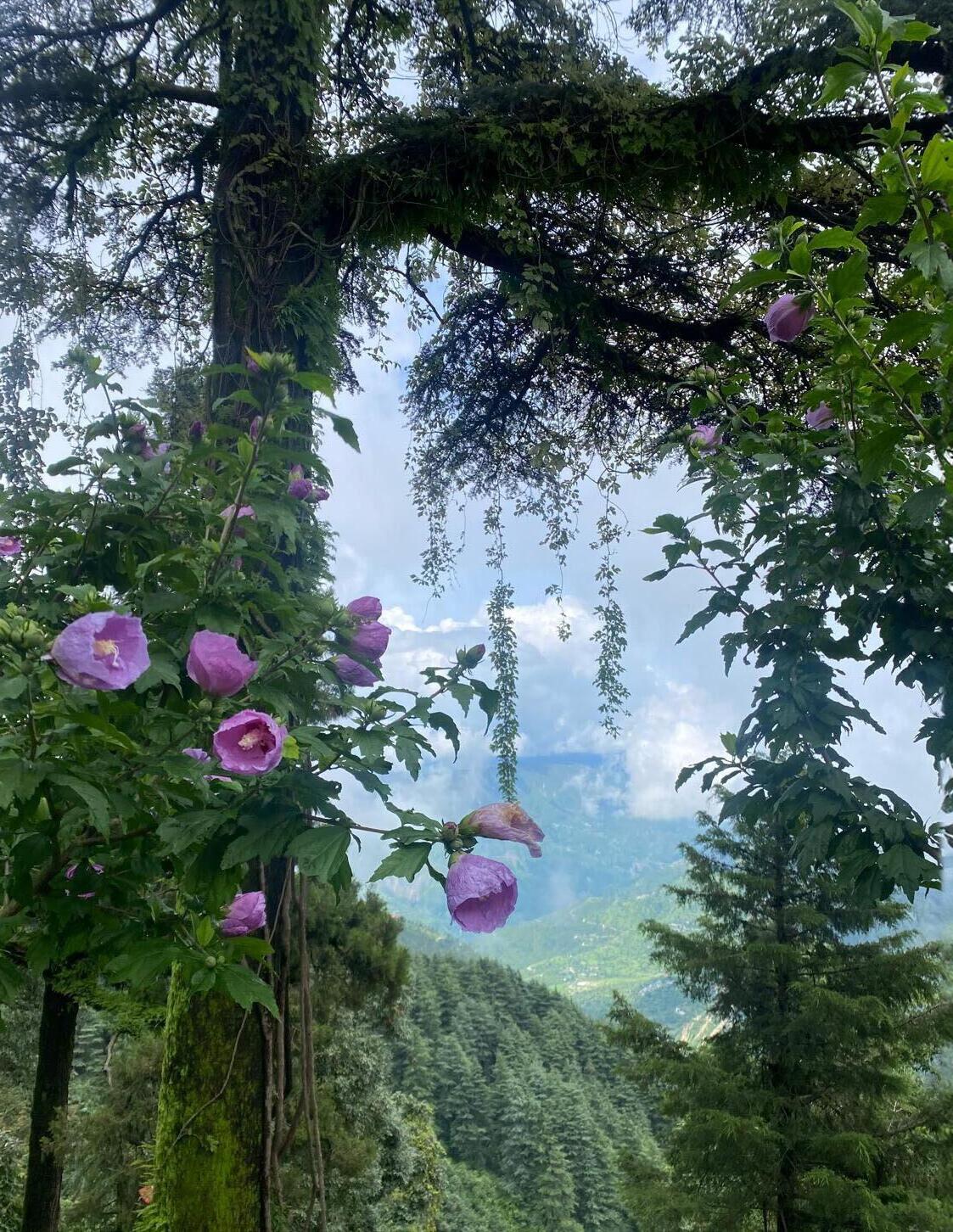

I think it is fair to say that the Center for South Asia had an epic year in 2023-2024, truly stretching our capacity with a wide range of extraordinary events. We began with our book club reading of Akwaeke Emezi’s compelling novel The Death of Vivek Oji (Riverhead, 2020) and ended with a fantastic annual lecture by Anjali Arondekar, our friend and colleague at UC Santa Cruz. Arondekar’s talk “Oceanic Sex: Archives of Caste and Indenture” enriched our ongoing conversation about caste. This theme has been central to our programming since 2021, resulting in a robust dialogue that truly reflects the complexities and nuances of caste in South Asia and beyond. In the fall we welcomed Karthick Ram Manoharan, a political philosopher from National Law School (Bangalore), whose work on Periyar (the so-called ‘father of the Dravidian Movement’) situates the anti-caste thinker within the intellectual currents of his time. In addition to lectures, SriVamsi Matta brought his extraordinary performance of “Come Eat with Me” to campus in which audience members join in throughout
Photo credit: Usha Iyer

and close with a shared meal. The film “Chaityabhumi,” about B.R. Ambdekar memorial site in Mumbai, was screened with the filmmaker Somnath Waghmare in conversation with Stanford graduate students Anup Hiwrale and Aatika Singh. We also welcomed authors Vauhini Vara (The Immortal King Rao and This is Salvaged), Manoj Mitta (Caste Pride: Battles for Equality in Hindu India), Yashica Dutt (Coming Out as Dalit), and Shailaja Paik (The Vulgarity of Caste).
Journalist Meena Kotwal, founder of Mooknayak, a news site dedicated to issues of concern to Dalit, tribal, and minority communities, spoke in conversation with Anjali Arondekar on a wide range of questions gathered from the audience. That event also picked up themes from an earlier talk by P. Sainath of the People’s Archive of Rural India on “Governance by Gagging: The State of Intellectual and Press Freedom in India.” Other highlights include Harini Kumar’s talk “Stones that Breathe: Counternarratives of Islamic Material Culture” that addressed how the enduring presence of Islamic architecture mediates memory, practice, and politics in Tamil Nadu. Hafsa Kanwal’s book tour for Colonizing Kashmir brought a packed house to Stanford. And we had the pleasure of learning from luminaries
Indrani Chatterjee and Nivedita Menon who gave talks on their respective works in progress. Memorably, CSA was fortunate to host once again the Kabir Singers with Prahlad Singh Tapaniya in performance and in conversation with the indefatigable Stanford Professor Emerita Linda Hess.
All of this work (and much, much more) is organized and supported by the seemingly tireless efforts of Associate Director Lalita du Perron and Program Coordinator Manar Fleifel-Keniar. Along with amazing interns Srihari Nageswaran, Khushmita Dhabhai, and Kailiti Singh, CSA sponsored, cosponsored, and coordinated over 50 events, performances, and podcasts. The reach of Lalita’s SASSPod continues to grow, highlighting the extraordinary range of South Asian studies and culture at Stanford. Importantly, this reflects not just the center staff’s incredible work, but also the fantastic level of engagement and commitment from our campus partners who help to organize, cosponsor, host, moderate, and even find rooms for our myriad activities. I look forward to working with the CSA team in the coming year to keep building our community.
Anna Bigelow, Faculty Director Associate Professor, Religious Studies Learn More About Our Director
The Team






Anna Bigelow
Faculty Director

Lalita du Perron Associate Director
Manar Fleifel-Keniar
Program Coordinator
Srihari Nageswaran 2022-2023 Center for South Asia- Markaz Fellow
Khushmita Dhabhai 2023-2024 Center for South Asia- Markaz Fellow
Kailiti Singh
Intern, Center for South Asia’s Arts, South Asian Literature and Art Festival 2024
Visiting Scholars

RUBINA FEROZE BHATTI
Assistant professor at Pakistan Global Institute, General Secretary of Pakistan Partnership Initiative

KARTHICK RAM MANOHARAN
Bliss Carnochan International Visitor at Stanford, National Law School of India University

MADHU SINGH

Department of English and Modern European Languages, Lucknow University and recipient of the Fulbright - Nehru Academic and Professional Excellence Fellowship at Stanford University
KALA SRIDHAR
Visiting Honorary Fellow at the Center for South Asia at Stanford Professor at the Centre for Research in Urban Affairs, Institute for Social and Economic Change, in Bengaluru, India

Highlights

Photo Credit: Aatika Singh, Center for South Asia
Ph.D. candidate, photographed “Buddha in Bareilly” in Bareilly, Uttar Pradesh, India, as part of the 2024 Stanford Global Studies Student Photo Contest.
“The Buddha statue was sculpted by a local artisan in Bareilly, carved in the Abhaya Mudra and clad in yellow drapery with a trademark ushnisha, open eyes and elongated ears. The statue signifies a centre of social life for the residents of Chawer, especially women where the amalgam of the iconographic details of the image with the everyday lived experience generates multiple moments of a counterculture visuality.
The iconographic contentions and their intertwined relationship with decades of Dalit history of assertion is revealing in itself. The image reflects dignity and selfrespect for women.”
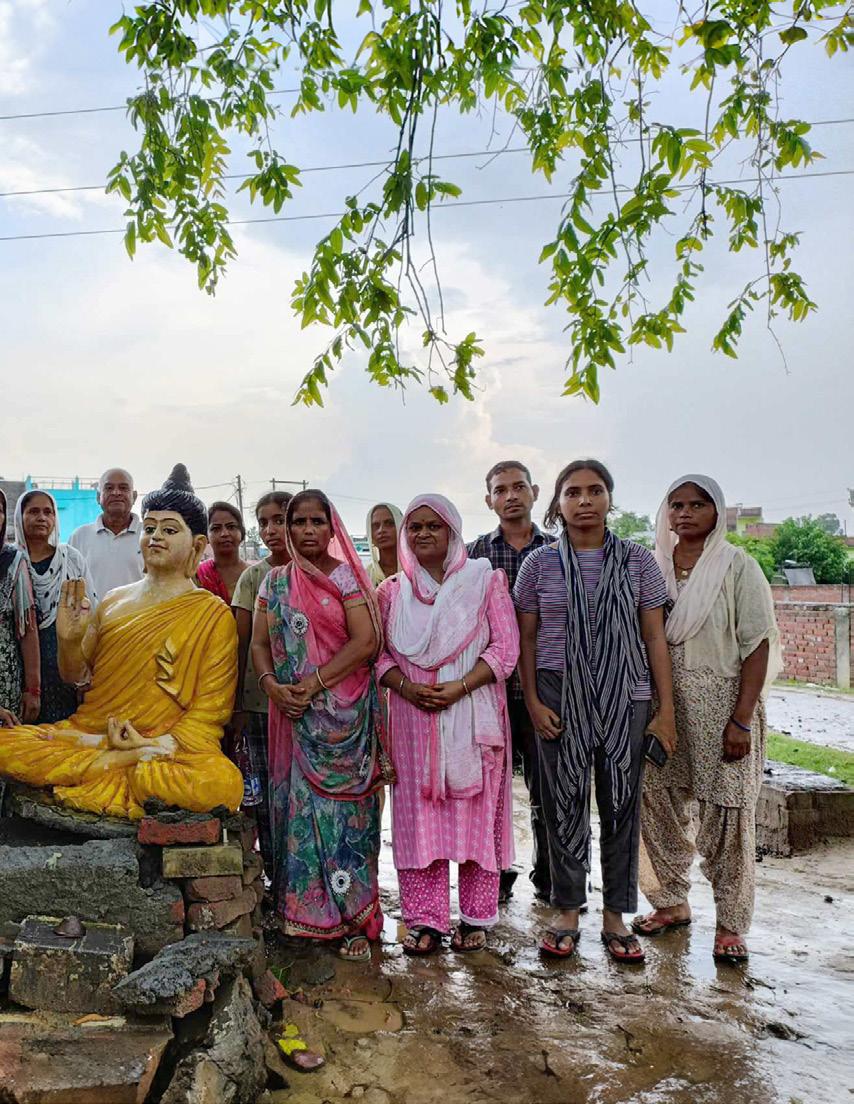
OUR REACH
SASSTUBE: 655 subscribers
Facebook: 5.8 K followers
Instagram: 1188 followers
SASSPOD: 2128 unique listeners, 3086 downloads

Caste Series Highlights


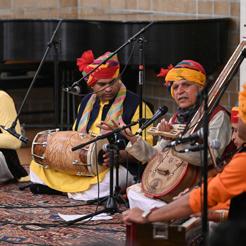





In the 2021-2022 academic year we initiated a series of programs focused on caste in and beyond South Asia. In 2023-24, we were fortunate to expand our caste series to invite prominent artists, authors, and scholars of caste to campus to speak to our community.
Our presenters included Shailaja Paik and Yashica Dutt, as well as speakers from Equality Labs to discuss SB403, the first anticaste discrimination bill in California.
We were fortunate to feature artists SriVamsi Matta and Prahlad Tipanya (see page 12 – 13).

Special thanks to our cosponsors and to Sharika Thiranagama, Anjali Arondekar, and Linda Hess for moderating the events. You can view recordings of the webinars on the SASS Tube.

Oceanic Sex: Archives of Caste and Indenture 2024 Annual Lecture | Anjali Arondekar
May 22, 2024
Anjali Arondekar is Professor of Feminist Studies, and Founding Director, Center for South Asian Studies, University of California, Santa Cruz. Her research engages the comparative poetics and politics of sexuality, caste, and historiography, with a focus on Indian Ocean Studies and South Asia. She is the author of For the Record: On Sexuality and the Colonial Archive in India (Duke University Press, 2009, Orient Blackswan, India, 2010), winner of the Alan Bray Memorial Book Award for best book in lesbian, gay, or queer studies in literature and cultural studies, Modern Language Association (MLA), 2010. Her second book, Abundance: Sexuality’s History (Duke University Press, 2023, Orient Blackswan, 2023), grows out of her interest in the archival figurations of sexuality, caste and historiography in British and Portuguese colonial India. The 2024 Annual Lecture at Stanford incorporated material from her current project on archives of indenture, caste and sexuality in Mauritius.


Kabir Singers with Prahlad Tipanya
May 3, 2024
On May 3, 2024, we hosted Prahlad Singh Tipanya and his ensemble in the beautiful space of Toyon Hall on campus. Prahlad and his troupe sing the poetry of Kabir, the great iconoclastic mystic of 15th-century North India, in the vigorous and joyful folk style of Madhya Pradesh’s Malwa region. Prahlad is renowned for his singing and interpretation of Kabir and other Hindi poets associated with nirgun-bhakti–devotion to a God or ultimate reality beyond word and form. Kabir is famous for both his profound mystical insight and his sharp social commentary. His voice is often invoked as inspiring communal harmony and social equality.
At the event, the songs of Kabir were translated and explained by Stanford Professor emerita and Kabir expert Linda Hess. The evening brought together over 220 attendees from the Stanford and wider community.
Learn More
• Prahlad’s youtube channel
• Two one-hour films from the first U.S. tour in 2003. The films present full bhajans with subtitles and show delightful encounters of the musicians with people and places in North America. Part 1, Part 2
• Introduced by Shah Rukh Khan


Photo credits: Rod Searcy
Come eat with me | Sri Vamsi Matta
April 20, 2024
What is the relationship between caste and food? A multiverse of infinity, says Sri Vamsa Matta, a Bangalore-based theater and performance artist whose durational performance renders his community’s cuisine as a metaphor of societal reality. In his 2024 performance at Stanford, Vamsi brilliantly incorporated his Dalit identity, location, and experience to display a reimagination of theater. He evoked memories of the erasure of culture, food, language, and habits of the marginalized in his audience by taking us on a journey of contemplation. The caste chronicle compiled oral history, personal stories, and the wisdom of Dr. B.R. Ambedkar to give us literally food for thought. In the end, a participative gluttony ensued as Vamsi invited us to share timeless dishes from his mother’s recipes. The current times make Vamsi’s work much needed as he laboriously creates a recipe for anti-caste art.




Student Awards
Photo Credit: Aatika Singh, Center for South Asia
Ph.D. candidate, photographed “Neetu’s Assertion” in Bareilly, Uttar Pradesh, India, as part of the 2024 Stanford Global Studies Student Photo Contest.
“The photograph shows Neetu Priyadarshini and her students. Neetu is a staunch Dalit woman currently pursuing her doctorate in sociology. As she walks us through the village, it is a pleasant surprise to see every household adorned with a Buddha or an Ambedkar photo. which reveals the anti-caste legacy of the village.“

Your gift matters.
Interested in supporting students studying language and conducting research in South Asia? Or global internships that encourage engagement with South Asia at Stanford? Please contact Lalita du Perron, lalita@stanford.edu, to find the best fit for your support. Your contribution could mean that one more student will have the opportunity to conduct critical research, study a South Asian language, or take part in a life-changing internship.
Global Internships

ANUSHA NADKARNI
Lex Firmus
Mumbai, India
In summer, Anusha spent 8 weeks studying law, democracy, and language in almost every major court in Mumbai, including the High Court of Maharashtra. Anusha says: “I will never forget the surprise on everyone’s faces each time they learned that I had come from America to study India’s growing democratic processes. The lessons we can learn from each other about justice and governance as the IndoAmerican relationship grows are invaluable, and this experience has compelled me to pursue a role in it.”

IVY PARKS
Magic Bus India Foundation
Mumbai, India
“One of the most memorable moments of my internship was spending a day at the schools where Magic Bus programs are implemented. It was truly inspiring to witness firsthand how eager and motivated these kids are. Seeing how much potential they have, and knowing that with the right support system, they can achieve so much, reinforced the importance of the work Magic Bus does.”

LUKE CLIFTON
Magic Bus India Foundation
Mumbai, India
“Simply put, working at Magic Bus has changed my life. During my work weeks, I would visit skilling centers and would help the staff mobilize. This meant that we’d go to slum areas in Mumbai and take down names of prospective program participants. Going into these communities was one of the most overwhelming experiences of my life. These days will forever shape the way that I view the world.”
The Steven and Debi Wisch Fellowship for Graduate Research in South Asian Studies

UTSAVI SINGH
Department of Anthropology
Building Memories: An Archaeology of Identity in a Frontier Region in India
More about Utsavi’s project


ALISHA CHERIAN
Department of Anthropology
Encounters and interactions among people of South Asian descent in public urban space in Singapore.
More about Alisha’s project
Language and Research Fellowships
Summer 2024
Click on the picture of the student to view more information about their projects.
Graduate Research Fellowship Recipients
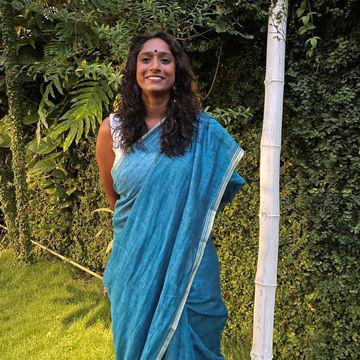

POORNIMA RAJESHWAR
Department of Anthropology
Lives and Livelihoods: An ethnographic study of dimensions of well-being

SUNIDHI PACHARNE
Department of Anthropology
Caste, desire, and social ramifications



RAHEMEEN
AHMED
Department of Civil Engineering
Disaster risk management, structural design, and sustainability.

SHUBHANGNI
GUPTA
Department of Anthropology
Heritage Afterlives: The Case of the Shekhavati Haveli in Rajasthan, India
Listen to the SASSPOD episode with Shubhangni
KHANDO
LANGRI
Department of Anthropology
Tibetan refugees, road building, and community: fate, faith and structural (im)possibility.
Language Fellowship Recipients

MAHISHAN GNANASEHARAN Department of Anthropology
Language: Sinhala
MÁIRE WHITE Department of Religious Studies
Language: Odia

The SASS at CSA
The South Asian Studies at Stanford (SASS) at the Center for South Asia includes our minor, podcast, and event recordings.
Photo credit: Usha Iyer



The Minor in Global Studies with a specialization in South Asian Studies presents undergraduates with a significant opportunity to scaffold their interest in and knowledge of South Asia. This track allows them to focus on South Asia while locating their work within larger global conversations.
More about our minor.
The South Asian Studies Minor SASS Graduate Spotlight


KAVIN ANAND
2024 South Asian Studies Minor Recipient
“Learning about historical events in different contexts is critical not only to developing a more pragmatic understanding of the world, but to be a more informed, global citizen. Those are skills that will last a lifetime, and the mindset will be invaluable as we navigate difficult political landscapes.”
More about Kavin’s experience
BHARATH NAMBOOTHIRY
2024 South Asian Studies Minor Recipient
“Studying South Asian studies as my minor compelled me to deeply engage with issues of caste, religion, politics, and history,” he shared. “This experience pushed me to develop and defend my own perspectives. It was eye-opening, and I feel that I am now a better Desi because of it.”
More about Bharath’s experience

The SASStube
The SASS Tube features our event recordings accessible to the public. Our YouTube channel has 655 subscribers. The majority of our viewers are from India, Pakistan, and the United States.
Visit and subscribe to the SASSTUBE.
Photo credit: Usha Iyer

The SASSpod
Lalita du Perron hosts a wide variety of guests on the podcast who have a Stanford connection: alumni, faculty, staff, researchers, students, and affiliates. With almost 6,000 listeners in 74 countries, the SASSpod captivates a global audience, who are interested in learning more about South Asia at Stanford.
Topics covered in 2023-24 include: post-colonialism, religion and spirituality, cooperatives and caste in India, gender inequality, gender norms, Education in Afghanistan, Liberal arts in Pakistan, care and kinship in India, South Asian literature, arts, dance, environmentalism, science, and geopolitics.
Click on the picture to listen to the episodes. More about the SASSpod.

Ambika Sahay, Executive Director, Art Forum SF

Suhani Jalota, PhD candidate at Stanford Fellow, Wellesley Centers for Women

Shantanu Neverkar, PhD Anthropology at Stanford

Ambika Vishwanath, Kubernein Initiative

Pashtana Durani, Executive Director LearnAfghan

Kenneth Nacario Lee (Kula Pradipa Das), Flourish and Faith Chaplain Associates at Stanford

Noopur, Raagapella, and Bhangra Groups at Stanford

Paras Arora, PhD candidate, Anthropology at Stanford

Nina Buchmann, PhD candidate in Economics

Wasif Rizvi, President of Habib University, Pakistan

Eduardo Acosta, Mellon Fellow at Stanford History


Shubhangni Gupta, PhD candidate , Anthropology at Stanford

Karthick Ram Manoharan, Bliss Carnochan International Visitor, Stanford

Ana Cristina Lopes, Former visiting fellow, Center for South Asia Assistant Professor, National Law School of India University

South Asia Working Group (SAWG)
Photo credit: Usha Iyer
Meet our organizers
The South Asia Working Group at Stanford (SAWG) is a space for dialogue and reflection for South Asianist students working on and engaging with South Asia. Imagined as a student forum co-sponsored by the Center for South Asia, it features a variety of events aimed at building an interdisciplinary graduate student community.
Meet our 2023-24 South Asia Working Group (SAWG) at Stanford Fellows:
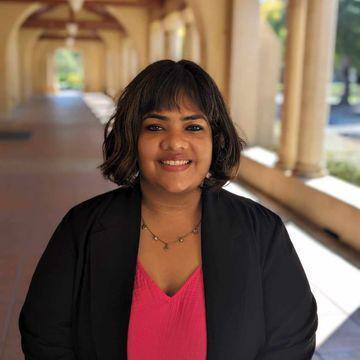

AATIKA SINGH
Ph.D. student at the Department of Art and Art History

Ph.D. student at Stanford Department of Theatre and Performance studies
MARLON ARIYASINGHE
2023-2024 SAWG Events


Virtual Event
On Dalit Verse, Dignity and Ecology: A Poetry Reading and Discussion
April 2024
With Gautam Vegda. In celebration of the 134th anniversary of Dr. B.R. Ambedkar. This online gathering delved into the intersections of caste, environmental justice, and human-animal relationships through the lens of poetic verse. Gautam Vegda is an anti-caste poet, illustrator, and research scholar. He was born in Surendranagar, Gujarat, and is one of the few Dalit poets from Gujarat who writes in English.

Learn more about SAWG events on the main SAWG page, linked in the event posters below. Background photo credit: Usha Iyer
In-person event
Screening of Ava DuVernay’s Origin (2023)
April 2024
Origin (2023), starring Aunjanue Ellis-Taylor, delves into discrimination within the United States and internationally, dramatizing the book Caste: The Origins of Our Discontents by Pulitzer Prize-winning journalist Isabel Wilkerson. The film portrays Wilkerson’s process of writing the book, which is integral to the narrative.



Hybrid event
Documentary film Screening : In Plain Sight With Documentary Filmmaker Ruvin de Silva
Organized in collaboration with the Stanford Sri Lankan Association (SSLA)
May 2024
In Plain Sight is a documentary that explores the connection between disappearances and mass graves in Sri Lanka by focusing on different narratives and perspectives, including those of affected families and loved ones. The screening was followed by a discussion with the filmmaker.
In-person event
Screening of Rohith Vemula (2017)
Directed by Srikanth Chintala
May 2024

In-person event
Kashmir X Palestine: Solidarity Teach in May, 2024
Organized in collaboration with the People’s University for Palestine.
Events

In the 2023-24 year, over 3000 people attended our 33 sponsored events.
More about our upcoming events.
Photo Credit: Rod Searcey

Lecture Series
The 23-24 Center for South Asia lecture series included speakers on a wide variety of topics, in addition to our vibrant and ongoing programming around caste. Many thanks to our Stanford faculty, staff, and students who moderated these events:
Faculty and Visiting Scholars
Anna Bigelow
Anuradha Bhasin
Halima Kazem
Lalita du Perron
Linda Hess
Madihah Akhter
Nasiruddin Nezaami
Partha Pratim Shil
Priya Satia
Roanne Kantor
Sharika Thiranagama
Thomas Blom Hansen
Stanford Students
Aatika Singh
Anup Hiwrale
Khushmita Dhabhai
Srihari Nageswaran
Sunidhi Pacharne

Co-sponsors
Abbasi Program in Islamic Studies
Clayman Institute for Gender Research
CREEES Center for Russian, East European & Eurasian Studies
Department of Art and Art History
Department of Religious Studies
Equality Labs
Hamid and Christina Moghadam Program in Iranian Studies
History Department
Stanford Global Studies Division
Stanford Humanities Center
Ho Center for Buddhist Studies

Click on the picture of the speaker to view the event information.









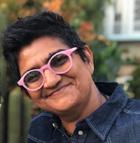












Akshya Saxena
Sreenivasan Jain
Anjali Arondekar
Palagummi Sainath
Robert Rakove
Harini Kumar
Yashica Dutt
Sumangala Damodaran
Hafsa Kanjwal
Kabir Singers
Nivedita Menon
Loriliai Biernacki
Vauhini Vara
Karthick Ram Manoharan
Indrani Chatterjee
Somnath Waghmare
James Mallinson
Meena Kotwal
Sri Vamsi Matta Shailaja Paik Bhavani Raman Madhu Singh
Caste Series

Karthick Ram Manoharan
An Account of Periyar’s Anti-Aryanism
October 16, 2023
Vauhini Vara
Dalit Dystopias & South Asian Science Fictions
October 24, 2023
Manoj Mitta
Caste Pride: Battles for Equality in Hindu India. A book talk by Manoj Mitta
November 2, 2023
Somnath Waghamare Chaityabhumi| Film Screening and Discussion
December 6, 2023
Yashica Dutt
Coming out as Dalit: Book Talk with Author Yashica Dutt
February 12, 2024
Sumangala Damodaran
Music and Social Movements in India1940s to the present
April 15, 2024











Sri Vamsi Matta
Come eat with me
April 20, 2024
Shailaja Paik
The Vulgarity of Caste: Dalits, Sexuality, and Humanity in Modern India: A Book Talk with Author Shailaja Paik
April 25, 2024
Meena Kotwal
Dalit Histories, Gender Formations: A Conversation with Journalist Meena Kotwal
May 1, 2024
Kabir Singers with Prahlad Tipanya
May 3, 2024
Anjali Arondekar
Oceanic Sex: Archives of Caste and Indenture
May 22, 2024
Afghanistan Lecture Series
The Implications of Taliban Takeover on Legal Education in Afghanistan
January 18, 2024


Victoria Fontan, Provost and Vice President of Academic Affairs at the American University of Afghanistan


Erik Jensen, Director of the Rule of Law Program, Stanford Law School; Affiliated Core Faculty, Stanford Center on Democracy, Development and the Rule of Law
Stephen A. Rosenbaum, MPP, JD, Frank C. Newman Lecturer at UC Berkeley Law; Visiting Researcher Scholar, Othering & Belonging Institute; Research Affiliate, Berkeley Interdisciplinary Migration Initiative

Moderator:
Nasiruddin Nezaami, Fellow, IIE-SRF, Stanford Law School; Research Fellow, Information Society Law Center, University of Milan; Assistant Professor of Law, American University of Afghanistan
Event co-sponsors: Abbasi Program in Islamic Studies, Center for South Asia
Afghanistan Lecture Series
Defiant Dreams: The Journey of an Afghan Girl Who Risked
Everything for Education (Book Talk)
January 25, 2024



Sola Mahfouz, Writer and Researcher at Tufts
University Quantum Information Group
Malaina Kapoor, Writer
Event co-sponsors: Abbasi Program in Islamic Studies , Center for South Asia, Hamid and Christina Moghadam Program in Iranian Studies, Stanford Global Studies Division
120 Years of Women’s Resistance in Iran and Afghanistan
May 20, 2024

Halima Kazem, Hoover Oral Historian
Kelly J. Shannon, Hoover Fellow
Moderators:
Lalita du Perron, Associate Director of the Stanford Center for South Asia
Rachel Jean-Baptiste, Michelle Mercer and Bruce Golden Family Professorship in Feminist and Gender Studies, Director of the Program on Feminist, Gender, and Sexuality Studies, and Professor of History
Event co-sponsors: Center for South Asia; Feminist, Gender, and Sexuality Studies; Hoover Institution Library & Archives
The South Asian Literature and Art Festival
We are delighted to be hosting the South Asian Literature and Arts Festival this year at Stanford. Please view the SALA 2024 page on our website to view this year’s program featuring Stanford scholars and South Asian artists, poets, authors, and other speakers.
Select

Future Programming

Highlights of the Fall quarter


Oct 8, 2024
Screening of Khayal Darpan, followed by Q&A with Yousuf Saeed
Oct 23, 2024
Preserving India’s MonumentsA 25-year journey, with Ratish Nanda
Nov 20, 2024
20th Anniversary of the publication of “Wave”, with Sonali Deraniyagal
Check out the Upcoming Events section on our website, sign up for our mailing list, and follow us on social media to find out about all our upcoming events.
Community insights
Q&A with Preeti
Shekar,
Bay Area journalist

What do you like best about the Center for South Asia?
I like the public community events with a diverse array of independent, established and mainstream South Asian scholars and artists that the Center regularly brings to Stanford. The Center is a gateway to meeting and learning from a rich assortment of experts, including journalists, activists, scholars and artists. The CSA ensures community knowledge and access to free public events featuring such an impressive array, and sometimes also through virtual attendance. This is a highly useful resource especially for those of us who draw greatly from ideas and knowledge exchanged at these events – for strengthening activism and organizing, analyses, and for the greater good of public education.

Which recent event stood out to you and why?
A recent event I deeply enjoyed was the talk by noted feminist scholar Nivedita Menon (Fall 2023). I enjoyed the intimate format and discussion; while it is unfortunate that this and many such events are not recorded, they do allow for a more nuanced and honest discussion/dialogue/conversation. The conversation was highly dynamic, engaging and thoughtprovoking thanks to the Center’s ability to host such events with public intellectuals and actively inviting community members like me.
What are the benefits of engaging with the Center to the larger South Asian community?
The south bay/the Silicon Valley is home to one of the largest South Asian diaspora in the US, and among the wealthiest. Community spaces that foster critical thinking are few and far in-between.
Especially at a time of a global pendulum like swing to the right, including especially in many South Asian countries especially India, it is critical to have spaces like the CSA to ensure there is a space for critical community discussions and to engage and learn from each other, and from the experts the center is able to bring. It would be helpful to have more of these community events later in the evenings or weekends, to enable greater community participation and engagement – something the CSA has been trying to do more recently. The newsletter is also a vital channel of information and updates about the CSA’s activities.
Do you have a word to best describe the Center?
Critically Engaged with the world. Or if just one word:
How to Give
The Center for South Asia extends sincere appreciation to our contributing alumni, parents, students, and friends for their generous support. Your support helps strengthen our existing programs and also create new ones to enhance our collaboration with Stanford faculty, students, and other university units. For more information about working with us to support the study of South Asia at Stanford, please contact Lalita du Perron, Associate Director at lalita@stanford.edu.

Make a Gift >>
Photo credit: Aatika Singh, Center for South Asia Ph.D. candidate, captured “Photo with Buddha” in Ajanta, Maharashtra, India, India.
“The photograph shows a young boy take a photo of a Buddha carving at Ajanta caves. I was in Ajanta for a research fieldwork visit when I took the photograph. I have been very enamoured by the factors that make people decide to click any object and save for later viewing. I try to analyse such subject matters in my work answering questions of memory, public art and aesthetic choices.”

Instagram: @csastanford
Youtube: @csastanford
Facebook: @StanfordCenterforSouthAsia
Website: southasia.stanford.edu
615 Crother Way
Encina Commons 124 Stanford, CA 94305
